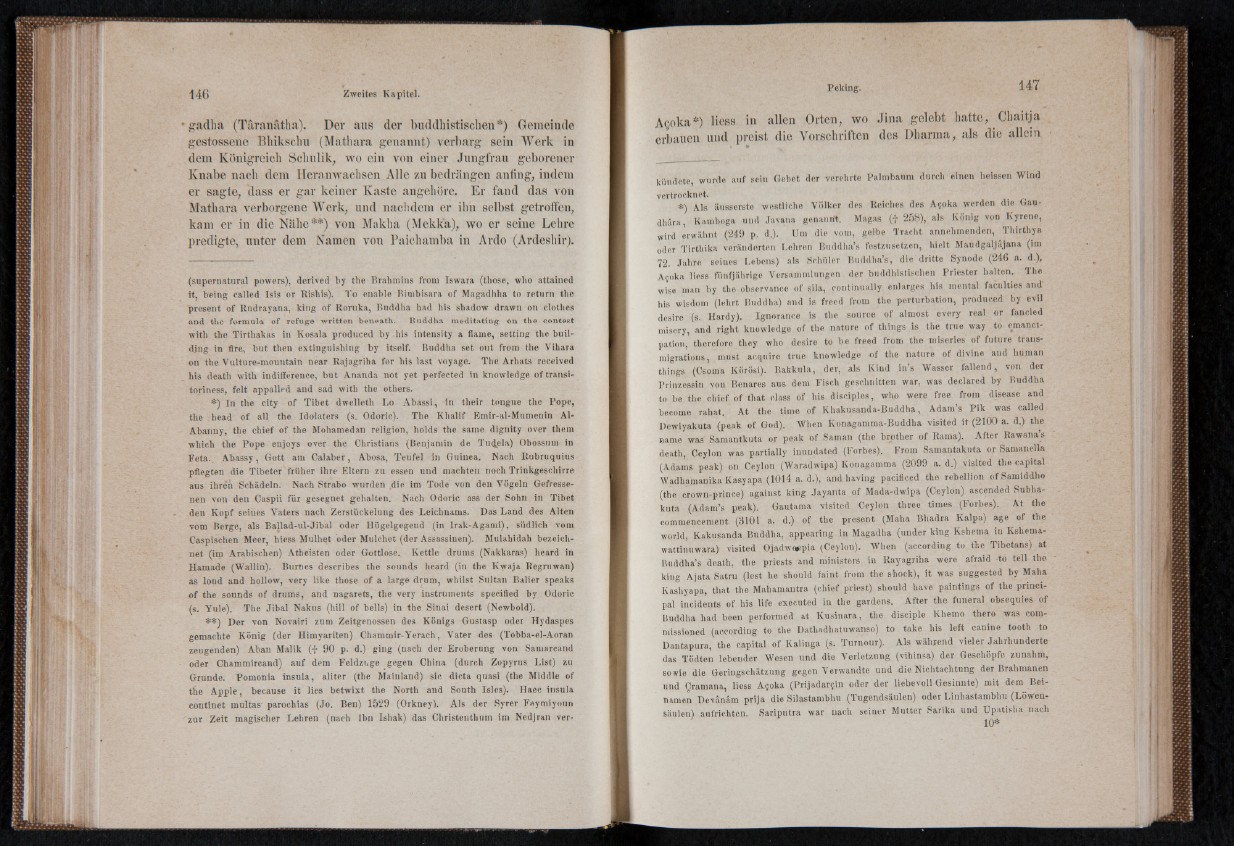
gadha (Täran&tha). Der aas der buddhistischen*) Gemeinde
gestossene Bhikschu (Mathara genannt) verbarg sein Werk in
dem Königreich Schnlik, wo ein von einer Jungfrau geborener
Knabe nach dem Heranwachsen Alle zu bedrängen anfing, indem
er sagte, dass er gar keiner Kaste angehöre. Er fand das von
Mathara verborgene Werk, und nachdem er ihn selbst getroffen,
kam er in die Nähe**) von Makha (Mekka), wo er seine Lehre
predigte, unter dem Namen von Paichamba in Ardo (Ardeshir).
(supernatural powers), derived by the Brahmins from Iswara (those, who attained
it, being called Isis or Rishis). To enable Bimbisara of Magadhha to return the
present of Rudrayana, king of Roruka, Buddha had his shadow drawn on clothes
and the formula of refuge written beneath. Buddha meditating on the contest
with the Tirthakas in Kosala produced by his intensity a flame, setting the building
in fire, but then extinguishing by itself. Buddha set out from the Vihara
on the Vulture-mountain near Rajagriba for his last voyage. The Arhats received
his death with indifference, bu t Ananda not yet perfected in knowledge of transitoriness,
felt appalled and sad with the others.
*) In the city of Tibet dwelleth Lo Abassi, in their tongue the Pope,
the head of all the Idolaters (s. Odoric). The Khalif Emir-al-Mumenin Al-
Abanny, the chief of the Mohamedan religion, holds the same dignity over them
which the Pope enjoys over the Christians (Benjamin de Tud.ela) Obossum in
Feta. Abassy, Gott am Calaber, Abosa, Teufel in Guinea. Nach Rubruquius
pflegten die Tibeter früher ihre Eltern zu essen und machten noch Trinkgeschirre
aus ihren Schädeln. Nach Strabo wurden die im Tode von den Vögeln Gefressenen
von den Caspii für gesegnet gehalten. Nach Odoric ass der Sohn in Tibet
den Kopf seines Vaters nach Zerstückelung des Leichnams. Das Land des Alten
vom Berge, als Ballad-ul-Jibai oder Hügelgegeud (in Irak-Agami), südlich vom
Caspischen Meer hiess Mulhet oder Mulchet (der Assassinen). Mulahidah bezeichnet
(im Arabischen) Atheisten oder Gottlose. Kettle drums (Nakkaras) heard in
Hamade (Wallin). Burnes describes the sounds heard (in the Kwaja Regrnwan)
as loud and hollow, very like those of a large drum, whilst Sultan Balier speaks
of the sounds of drums, and nagarets, the very instruments specified by Odoric
(s. Yule). The Jibal Nakus (hill of bells) in the Sinai desert (Newbold).
**) Der von Novairi zum Zeitgenossen des Königs Gustasp oder Hydaspes
gemachte König (der Himyariten) Chammir-Yerach, Vater des (Tobba-el-Aoran
zeugenden) Aban Malik ( f 90 p. d.) ging (nach der Eroberung von Samarcand
oder Chammircand) auf dem Feldzuge gegen China (durch Zopyrns List) zu
Grunde. Pomonia insula, aliter (the Mainland) sic dicta quasi (the Middle of
the Apple, because it lies betwixt the North and South Isles). Haec insula
continet multas- parochias (Jo. Ben) 1529 (Orkney). Als der Syrer Faymiyoun
zur Zeit magischer Lehren (nach Ibn Ishak) das Christeuthum im Nedjran ver-
Acoka*) Hess in allen Orten, wo Jina gelebt hatte, Chaitja
erbauen und preist die Vorschriften des Dharma, als die allein
kündete, wurde auf sein Gebet der verehrte Palmbaum durch einen heissen Wind
vertrocknet.
*) Als äusserste westliche Völker des Reiches des A?oka werden die Gau-
dhära, Kamboga und Javana genannt. Magas ( f 258), als König von Kyrene,
wird erwähnt (249 p. d.). Um die vom, gelbe Tracht annehmenden, Thirthya
oder Tirthika veränderten Lehren Buddha’s festzusetzen, hielt Maudgaljäjana (im
72. Jahre seines Lebens) als Schüler Buddha’s , die dritte Synode (246 a. d.),
Afoka liess fünfjährige Versammlungen der buddhistischen Priester halten. The
wise man by the observance of sila, continually enlarges his mental faculties and'
his wisdom (lehrt Buddha) and is freed from the perturbation, produced by evil
desire (s. Hardy). Ignorance is the source of almost every real or fancied
misery, and right knowledge of the nature of things is the true way to emancipation,
therefore they who desire to be freed from the miseries of future transmigrations,
must acquire true knowledge of the nature of divine and human
things (Csoma Iiörösi). Bakkula, der, als Kind in ’s Wasser fallend, von der
Prinzessin von Benares aus dem Fisch geschnitten war, was declared by Buddha
to be the chief of that class of his disciples, who were free from disease and
become rahat. At the time of Khakusanda-Buddha, Adam’s Pik was called
Dewiyakuta (peak of God). When Konagamma-Buddlia visited it (2100 a. d.) the
name was Samautkuta or peak of Saman (the brother of Rama). After Rawana’s
death, Ceylon was partially inundated (Forbes). From Samantakuta or Samanella
(Adams peak) on Ceylon (Waradwipa) Kouagamma (2099 a. d.) visited the capital
W a d h a m a n i k a Kasyapa (1014 a. d.), and having paciflced the rebellion ofSamiddho
(the crown-prince) against king Jayanta of Mada-dwipa (Ceylon) ascended Subha-
kuta (Adam’s peak). Gautama visited Ceylon three times (Forbes). At the
commencement (3101 a. d.) of the present (Maha Bhadra Kalpa) age of the
world, Kakusanda Buddha, appearing in Magadha (under king Kshema in Kshema-
wattinuwara) visited Ojadww-pia (Ceylon). When (according to the Tibetans) at
Buddha’s death, the priests and ministers in Rayagriha were afraid to tell the
king Ajata Satru (lest he should faint from the shock), it was suggested by Maha
Kashyapa, that the Mahamautra (chief priest) should have paintings of the principal
incidents of his life executed in the gardens. After the funeral obsequies of
Buddha had been performed at Kusinara, the disciple Khemo thero was commissioned
(according to the Dathadhatuwanso) to take his left canine tooth to
Dantapura, the capital of Kalinga (s. Turnour). Als wähyend vieler Jahrhunderte
das Tödten lebender Wesen und die Verletzung (vihinsa) der Geschöpfe zunahm,
sowie die Geringschätzung gegen Verwandte und die Nichtachtung der Brahmanen
und Qramana, liess A?oka (Prijadarfin oder der liebevoll Gesinnte) mit dem Beinamen
Devänäm prija die Silastambhu (Tugendsäulen) oder Linhastambhu (Löwensäulen)
aufrichten. Sariputra war nach seiner Mutter Sarika und Upatisha nach